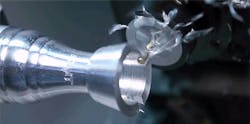Nanotechnology is a new subject to most people in North America. It’s an area of scientific development that only lately has been introduced to educational curricula, so most of us have no real idea of how nanotechnology can be applied to practical matters. In the case of Tool-X metalworking fluids, machine shops and other manufacturers should recognize that nanotechnology is the basis for super-lubricating properties that will help to improve everyday machining processes.
“Nanotechnology” is the design, characterization, production, and application of structures, devices, and systems by controlled manipulation of size and shape (at the nanometer scale), to produce structures, devices, and systems with novel or superior characteristics. That is, by redesigning something at its microscopic level, it can perform better.
“Nano” means billionth, meaning it describes something so small you cannot see it with the human eye. Nanoparticles have the ability to change the structure and characteristics of products we see and use every day. Gore-Tex fabrics used for hunting and fishing clothing and Rain-X coatings on windshields of cars and trucks are commercial examples of products enhanced by nanoparticles. Nanotechnology is in our world now, and it will remain.
These technologies are the results of U.S. government research grants that allow scientists to develop a product, first for military use, then later (if possible) for civilian applications. In the later cases, the technology can move through U.S. Government Technology Transfer Program and released to the buying public.
Many everyday products are derived from such government programs, like M&M candies: soldiers in the field needed a snack food that would not melt in their hands. Spam, a potable meat product, was likewise developed for servicemen. Super glue, duct tape, GPS, and the Internet and many more examples were developed initially using government grants.
Both Rain-X and Tool-X emerged from nanotechnology programs designed for military applications and then offered to the public.
Tool-X was granted funds to develop a super lubricant for a US Army program. The product now available to manufacturers and machine shops has been modified into cutting oils and a water-based coolant — called Nano Fluids.
The formulation of this nano-material remains closely held military information that Tool-X uses only for manufacturing nano-fluids that will promote tool-life longevity, not only for machine tools but for industrial drills and saws, too. Many users have reported tool life doubled after adopting the nano-fluid lubricants.
The water-based coolant has only 12 chemical ingredients, in contrast to 30-40 chemicals in many coolant formulations. This will be another advantage to any manufacturing operation aiming to lower its chemical footprint.
New ideas and products seem to arrive in the hands of consumers every day, in communication, in food and consumer goods, in finance, and at last in manufacturing. The technologies that change the ways we live and work are available – and nanotechnology is having an effect that will be impossible to overlook.
Tool-X LLC president Jim English is a former GM engineer with experience in chemicals and coatings, adhesives, plating technologies, fasteners, and lubricants.
This is the first of a series of reports on nanotechnology for machining. Read part 2, Applying Nanotech to CNC Machining; and part 3, What Can Nanotech Do in Your Machine Shop?
About the Author
Jim English
President
Tool-X LLC president Jim English is a former GM engineer with experience in chemicals and coatings, adhesives, plating technologies, fasteners, and lubricants.
